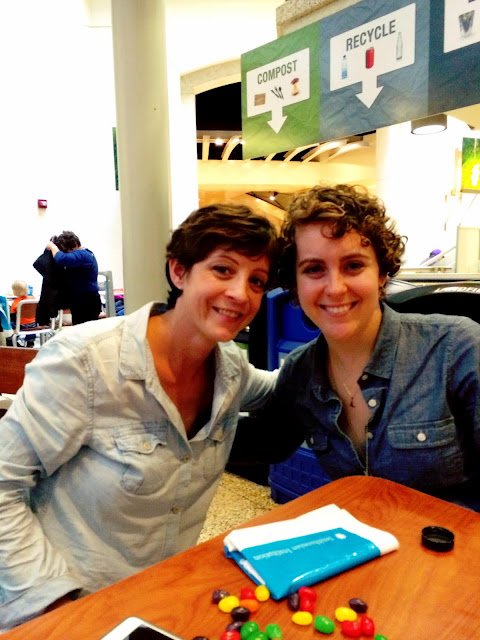Last week, Theresa's Research and the Mayo Clinic held their sixth annual Metastatic Breast Cancer Conference. It was here in Scottsdale, so I lined up childcare for two days (though I keep wishing conferences would add it to their offerings) and drove down the street to see what was new in research and give hugs to a few of my friends -- Susan and Kelly and Julia and Christine and Jersi and Janice and Kate, for starters.
I first met Kate five years ago when I went to DC for a friend's wedding and to get my nipples tattooed by Vinnie. It was springtime, and pouring down rain. We met at the Museum of Natural History because I couldn't figure out where else to go with my 3-year-old son in a downpour. A million other people had the same idea, but Kate patiently sat with us in the cafe as Quinn ate gummy worms and we talked about my metastatic disease and what it had been like to see Vinnie. At the time, Kate was an early-stage survivor but always a strong advocate for research. She'd been originally diagnosed when she was 25.
Last year, she was diagnosed with mets. Now, she (and thousands just like her) is anxious for additional treatment options.
 |
| Kate and me in DC, 2014 |
"I'm so glad you're okay," she told me between sessions as we sat next to each other in the chilly conference room on Friday.
"Thanks," I responded. "I want you to be, too."
"I won't be," she said, and we both teared up and looked away from each other.
Kate was in town with her dad, and I spent a while talking to him about his frustration and anger. We need to do more, and better, for the nearly 42,000 women and 500 men who are still dying of this disease every year.
Because we still don't have enough options, and so many of the sessions we heard about were on cellular pathways in mouse models -- still likely a decade away from clinical trials.
There was one session on outliers, those who live more than a decade with metastatic disease. People like my friend Dikla, who just passed 17 years since her MBC diagnosis. Not everyone diagnosed with MBC will die from it, and researchers are still trying to find out why. What makes those people unique, while others are failed by treatment after treatment?
On the first day, I met an older woman with a strong New York accent. She told me about her son with cerebral palsy, and how he's the most successful of her kids, how she must've done something right. She complained about her doctor's recommendation that she lose some weight as she snacked on a bag of conference-issue potato chips. She said 'fuck' a lot, and I liked her right off the bat.
Friday morning, I asked her whether she went by Liz or Elizabeth. "It's Nicole," she corrected, and we laughed about the lingering effects of chemobrain. Later, as we were saying goodbye that afternoon, she said, "You know, I really don't know what to say to people who tilt their heads -- you know, like this," she demonstrated with an exaggerated ear-to-shoulder move, "and want to know how I'm doing. 'No, how are you REALLY doing?'" she imitated, clearly annoyed by the question, or the pity it evoked, or both.
We wondered whether people really want to hear all the side effects that cancer patients, especially metastatic patients, face on a daily basis. Do well-meaning friends really want to know how fatigued she is feeling? That her nails are ridged (as are mine, years later) because the chemo is so harsh? Or should she just respond, "I'm here today, thanks for asking," and keep it brief but polite?
***
On Sunday evening, as I lay on the couch next to Quinn, who was watching an NFL game and planning for his fantasy football league, I opened Facebook on my phone and gasped audibly. Quinn turned to me and asked what was wrong. I stammered, not wanting to share with him, but I couldn't stop the tears. "Mom, what is it? What happened?" I took a deep breath and sighed heavily. "My friend died," I admitted. I got up, walked into our kitchen, put my head in my hands, and sobbed.
The news floored me, and shook much of my online community. Just a couple of weeks ago, Berta had posted she was starting a new combination chemo. I didn't know what else to say, so I told her I loved her. I hadn't seen any updates since then, but I also hadn't checked in. I hadn't asked how she was doing because I figured the daily was probably shit on new chemo, but I also didn't think she was doing so bad that she'd be gone this quickly.
News in cancerland can change so quickly. We can anticipate death for years, but when it happens, it is sudden. We can make the choice not to check in and then checking in is no longer an option.
 |
| 8 of the 10 women in this photo have or had metastatic breast cancer. 2 are now gone. |
Dr. Ziauddin Hospital's Digital Platforms:
To book an appointment call us at 0321-3660249
or click on the link below:
Reference:
http://www.boobyandthebeast.com/




Comments
Post a Comment